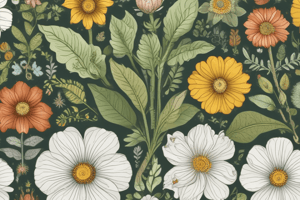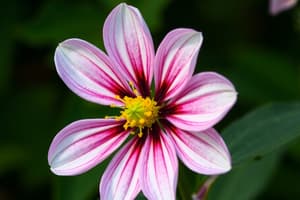Podcast
Questions and Answers
What are the four classifications of flowers?
What are the four classifications of flowers?
- Annual, Perennial, Biennial, and Seasonal
- Line, Mass, Form, and Filler (correct)
- Decorative, Base, Structural, and Foliage
- Wild, Cultivated, Perennial, and Exotic
What are the characteristics of Line Flowers?
What are the characteristics of Line Flowers?
Long, tall, slender; blooms along the stem; determines height and width; creates the framework.
What flowers are examples of Line Flowers?
What flowers are examples of Line Flowers?
Curly Willow, Eucalyptus, Gladiolus, and Tuberose.
What are the characteristics of Mass Flowers?
What are the characteristics of Mass Flowers?
What flowers are examples of Mass Flowers?
What flowers are examples of Mass Flowers?
What are the characteristics of Form Flowers?
What are the characteristics of Form Flowers?
What flowers are examples of Form Flowers?
What flowers are examples of Form Flowers?
What are the characteristics of Filler Flowers?
What are the characteristics of Filler Flowers?
What flowers are examples of Filler Flowers?
What flowers are examples of Filler Flowers?
What is Foliage in floral arrangements?
What is Foliage in floral arrangements?
What flowers are examples of Foliage?
What flowers are examples of Foliage?
Which flowers bloom along the stem?
Which flowers bloom along the stem?
What is the meat of the design?
What is the meat of the design?
Which flowers are the most expensive ones?
Which flowers are the most expensive ones?
Which flowers enhance instead of distracting?
Which flowers enhance instead of distracting?
What are the two different types of filler flowers?
What are the two different types of filler flowers?
Which type of plant is also called 'greenery'?
Which type of plant is also called 'greenery'?
Flashcards are hidden until you start studying
Study Notes
Flower Classifications
- Four classifications of flowers: Line, Mass, Form, and Filler.
Line Flowers
- Characterized by long, tall, and slender stems.
- Blooms are arranged along the stem, contributing to the overall height and width of the arrangement.
- Establishes the framework or structural foundation for floral designs.
- Examples include Curly Willow, Eucalyptus, Gladiolus, and Tuberose.
Mass Flowers
- Typically features a single stem with a large, round bloom.
- Adds depth to the floral arrangement and draws attention to focal points.
- Known as the "meat" of the design; they are simple in structure with minimal detail.
- Examples include Peonies, Lisianthus, Sweetheart Rose, and Standard Carnation.
Form Flowers
- Notable for their distinctive or unusual shapes, contributing drama and interest to arrangements.
- Should be used individually—avoid crowding to maintain their impact.
- Generally the most costly type of flowers.
- Examples consist of Asiatic Lily, Freesia, Calla Lily, and Sunflower.
Filler Flowers
- Serve the purpose of filling gaps in arrangements, masking imperfections and mechanics.
- They help create patterns, adding depth and texture without being distracting.
- Designed to enhance the overall arrangement rather than draw attention away.
- Examples include Baby's Breath and Spray Chrysanthemum.
Foliage
- Referred to as "greenery," it provides a finishing touch to floral arrangements.
- Conceals mechanics and structures behind flower placements.
- Offers little emphasis on its own, primarily supporting other elements.
- Common types include Leatherleaf Fern, Lemon Leaves, and Palm Leaves.
Types of Filler Flowers
- Filler flowers can be categorized as Bunchy or Feathery, offering different textures and appearances in arrangements.
Studying That Suits You
Use AI to generate personalized quizzes and flashcards to suit your learning preferences.



